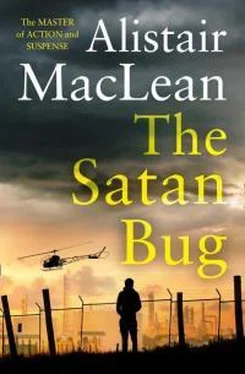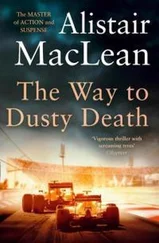Each row of buildings was about a quarter of a mile in length, with about two hundred yards separating the rows. The space between buildings and boundary fence, five hundred yards at the nearest approach, was completely open, completely clear. No trees, no bushes, no shrubs, not even a clump of flowers. A man can hide behind a bush. He might even be able to hide behind a clump of flowers. But he can’t hide behind a blade of grass two inches high – and nothing higher grew in the bleak desolation of the grounds of Mordon. The term boundary fence – not a wall, people can hide behind walls – was a misnomer. Any World War 2 concentration camp commandant would have sold his soul for Mordon: with fences like those a man could sleep soundly at nights.
The outer barbed-wire fence was fifteen feet high and sloped outwards at so sharp an angle that the top was four feet out of line with the foot. A similar fence, only sloping the other way, paralleled the outer for its entire perimeter at a distance of about twenty feet. The space between those fences was patrolled at night by alsatians and dobermann-pinschers, trained man-hunters – and if need be, man-killers – answerable only to their own Army handlers. Three feet inside the second fence and actually below its overhang, was a two-strand trip-wire fence, of so fine a metal as to be normally almost invisible – and certainly would be invisible to anyone climbing down at nighttime from the top of that second fence. And then, another ten feet away, was the last fence, each of its five strands running through insulators mounted on concrete posts. The electric current passing through those wires was supposed to be less than lethal if, that is, you were in good health.
To make sure that everyone got the general idea the Army had put up notice-boards at ten-yard intervals round the entire perimeter of the outer fence. There were five different types of notices. Four of them, black, on white, read, “DANGER KEEP OUT BY ORDER”: “WARNING GUARD DOGS IN USE”: “PROHIBITED PLACE” and “ELECTRIFIED FENCES”: the fifth, a violent red on yellow, said simply: “W. D. PROPERTY: TRESPASSERS WILL BE SHOT.” Only a madman or complete illiterate would have attempted to break his way into Mordon.
We came on the public ring road that completely surrounded the camp, bore right by the gorse-covered fields and after a quarter of a mile turned into the main entrance. The police driver stopped just short of the lowered boom and wound down his window as a sergeant approached. The sergeant had a machine-pistol slung over his shoulder and it wasn’t pointing at the ground either.
Then he caught sight of Cliveden, lowered his gun, gave a signal to a man we couldn’t see. The boom rose, the car moved on, halted before heavy steel crash-gates. We left the car, passed through a steel side door and made our way into a one-storey block marked “Reception.”
Three men waited for us there. Two I knew – Colonel Weybridge, deputy commandant of Mordon, and Dr. Gregori, Dr. Baxter’s chief assistant in “E”’ block. Weybridge, though technically under Cliveden’s command, was the real boss of Mordon: a tall, fresh-faced man with black hair and an incongruously iron-grey moustache, he was reputed to be an outstanding doctor. Mordon was his life: he was one of the few with his own living accommodation on the premises and it was said that he never passed outside the gates twice a year. Gregori was a tall, heavy, swarthy, dark-eyed man, an Italian and ex-professor of medicine from Turin, and a brilliant microbiologist greatly respected by his fellow scientists. The third man was a bulky, shapeless character in a bulky shapeless tweed suit who looked so much like a farmer that he had to be what he turned out to be – a policeman in plain clothes. Inspector Wylie, of the Wiltshire Constabulary.
Cliveden and Weybridge made the introductions, then Hardanger took over. Generals and Colonels or not, Army establishment or not, there was no question from the word “go“ as to who was in complete charge. Hardanger made it clear from the start.
He said bluntly, “Inspector Wylie, you shouldn’t be here. No member of any county constabulary has any right to be inside those gates. But I doubt if you knew that and I’m sure you’re not responsible for your presence here. Who is?”
“I am.” Colonel Weybridge’s voice was steady, but he was on the defensive. “The circumstances are unusual, to say the least.”
“Let me tell it,” Inspector Wylie put in. “Our headquarters got a call late last night, about eleven-thirty, from the guardhouse here, saying that one of your car crews – I understand jeeps patrol the ring road all night – had given chase to some unidentified man who seemed to have been molesting or attacking a girl just outside your grounds. A civilian matter, outwith Army jurisdiction, so they called us. The duty sergeant and constable were here by shortly after midnight, but found nothing and no one. I came along this morning and when I saw the fences had been cut – well, I assumed there was some connection between the two things.”
“The fences cut!” I interrupted. “The boundary fences? It’s not possible.”
“I’m afraid it is, Cavell,” Weybridge said gravely.
“The patrol cars,” I protested. “The dogs, the trip wires, the electric fences. How about them?”
“You’ll see yourself. The fences are cut, and that’s all that’s to it.” Weybridge wasn’t as calm as he seemed on the surface, not by a long way. I would have taken long odds that he and Gregori were badly frightened men.
“Anyway,” Inspector Wylie went on calmly, “I made inquiries at the gate. I met Colonel Weybridge there and he asked me to make inquiries – discreet inquiries – to try to trace Dr. Baxter.”
“You did that?” Hardanger asked Weybridge. The voice was speculative, the tone neutral. “Don’t you know your own standing orders? That all inquiries are to be handled by your own security chief or my office in London?”
“Clandon was dead and–”
“Oh, God!” Hardanger’s voice was a lash. “So now Inspector Wylie knows that Clandon is dead. Or did you know before, Inspector?”
“No, sir.”
“But you do now. How many other people have you told, Colonel Weybridge?”
“No one else.” His voice was stiff, his face pale.
“Thank heaven for that. Don’t think I’m carrying security to ridiculous lengths, Colonel, for it doesn’t matter what you think or what I think. All that matters is what one or two people in Whitehall think. They give the orders, we carry them out. The instructions for an emergency such as this are quite clear. We take over – completely. You wash your hands of it – completely. I want your co-operation, of course, but it must be cooperation on my terms.”
“What the superintendent means,” Cliveden said testily, “is that amateur detecting is not discouraged, it’s forbidden. I suppose that includes me too, Hardanger?”
“Don’t make my job more difficult than it is already, sir.”
“I won’t. But, as Commandant, I must ask for the right to be kept informed of all progress and the right to be present when number one lab in ‘ E’ block is opened up.”
“That’s fair,” Hardanger agreed.
“When?” Cliveden asked. “The lab, I mean.”
Hardanger looked at me. “Well? The twelve hours you spoke of are up.”
“I’m not sure.” I looked at Dr. Gregori. “Has the ventilation system been started up in number one?”
“No. Of course not. Nobody’s been near the place. We left everything strictly alone.”
“If anything had been, say, knocked over,” I went on carefully. “Would oxidisation be complete?”
“I doubt it. Air’s too static.”
Читать дальше
Конец ознакомительного отрывка
Купить книгу












